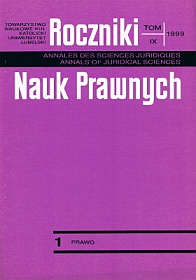Korporacje prawa publicznego w teorii i praktyce prawa niemieckiego
Abstrakt
Legal persons of public law are active in three organisational forms: corporation, institution and foundation. However, corporations are most often come across. A public law corporation is an organisation consisting of members and independent of their exchanges. It owes its individual character as a subject of rights not to its private autonomy but to a legal act, namely, to a law or to a state act passed on the basis of a law. Corporations may be classified in many different ways, among others, according to the criterion of how the members are related the following types of corporations are distinguished: territorial, real, personal, federative and collective. Territorial corporations are most significant in public law. State and territorial self-rule units are fundamental corporations of this type. Theories recognising state's personality at law may be divided into three groups: a) political-legal theories that have been worked out by the natural school; then speculative currents, in which the idea of state was completely subjected to a philosophical system; b) sociological-legal theories worked out within the organic school (O. v. Gierke) or the inorganic school (W.Alrecht, G. Jellinek); c) methodological-legal theory of the Vienna school. G. Jellinek defined state as a territorial corporation endowed with the original authority to rule. In Germany public law corporations also include universities and other institutions of this type, professional corporations and some religious communities. Religious communities have the status of public law corporations as far as they have had it so far, or as far as they guarantee their stability with their constitution or with the number of their members.
Copyright (c) 1999 Roczniki Nauk Prawnych

Utwór dostępny jest na licencji Creative Commons Uznanie autorstwa – Użycie niekomercyjne – Bez utworów zależnych 4.0 Międzynarodowe.


